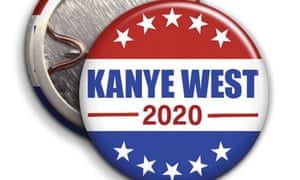
Article 1 - http://www.dailymail.co.uk/news/article-3247863/Kanye-West-confirms-plan-run-president-2020-calls-Ben-Carson-brilliant-guy-revealing-spent-weeks-trying-contact-Republican-hopeful.html
Article 2 - http://www.theguardian.com/music/2015/sep/03/why-kanye-west-would-be-the-best-president-in-us-history-seriously
The article in The Guardian is different to the article in the Daily Mail in many different ways. Firstly The Daily Mail uses quotes from an interview with Kanye West where as The Guardian uses quotes from several of Kanye's songs and talks about what kind of president this could make him. The mail is more about Kanye's views on becoming president, when speaking in an interview on this topic Kanye said '' I’ve got five years before I go and run for office and I’ve got a lot of research to do, I’ve got a lot of growing up to do. '' Where as the guardian seems focused on What type of president he might become based on the lyrics he uses in his music ''And if you're losin' your high then smoke again- Get 'em high (2004)'' They use this lyric to suggest that West will probably be pro-drug reform.
The Daily Mail also seems to be more formal than the Guardian as it uses facts and quotes whereas The Guardian seems to be making suggestions and accusations towards what Kanye is going to do if he is elected leader. '' West said; 'It’s fun to be a rock star, and I’ll never not be one I guess, but there’ll be a point where I become my mother’s child.
'With all the things I’ve done that people would consider to be accomplishments, what’s the point where I become the person that Donda and Raymond West raised? My parents’ child.' '' -The Daily Mail
'' He understands whats wrong with contemporary america: 'The system broken, the schools closed, the prisons open- power(2010)' '' - The Guardian
The Daily Mail also has more mixed media than The Guardian...
The Daily Mail contains:
- Images
- Text
- Videos
- Links
- Quotes
- summary
- captions
- headline
The Guardian contains:
- Text
- Images
- Quotes
- Headline
The use of mixed mode in The Daily Mail makes the article more appealing as most people would rather look at a piece of text that has images and colour to accompany it rather than a wall of writing.
